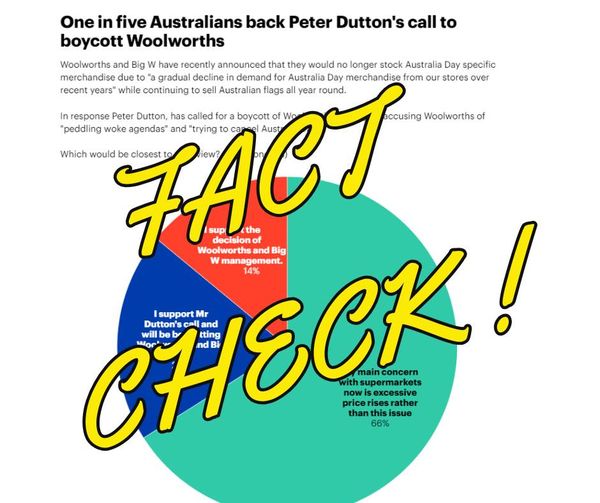YouGov and the Art of ‘Perception Management’
Last week YouGov conducted a survey on how many Australians support the Opposition Leader, Peter Dutton’s call for a Boycott of Woolworths.
Dutton’s call was in response to the Woolworths Group’s announcing they would no longer be stocking Australia Day products in its stores due to ‘sensitivities’ around the holding of the country’s National Day on 26 January.
The survey results were immediately jumped on by the media, who all ran almost identical headlines proclaiming that:
“Only 20% of Australians back Dutton’s call to boycott Woolworths”.
YouGov itself stated that its “public data poll found that only 20% of Australian voters back opposition leader, Peter Dutton’s call to boycott Woolworths and Big W.”
The company’s statement, like its survey, is highly misleading.
Instead of simply posing a straightforward question, like: “Do you support Peter Dutton’s call for a boycott?”, YouGov presented respondents with three options and asked them to choose the one that “most applies to you”.
The three options were as follows:
– I support the decision of Woolworths and Big W management (14%);
– I support Mr Dutton’s call and will be boycotting Woolworths and Big W (20%); and
– My main concern with supermarkets now is excessive price rises rather than this issue (66%).
Obviously, most people presented with these options – including myself – would select price gouging by supermarkets as the more concerning issue for them, during a cost-of-living crisis.
It should be noted, however, that the last two options are NOT mutually exclusive.
In other words, the selection of option 3 doesn’t automatically mean that someone isn’t ALSO supportive of option 2.It simply means that price gouging by Woolworths is MORE of a concern.

So, to conclude that “ONLY 20% of Australians back Dutton’s call for a Woolworths boycott” from the survey’s results, is both a logical nonsense, AND a prime example of mal-information (“information that stems from the truth but exaggerated or framed in a way that misleads”).
As a professional data analytics company, YouGov knows all this.
They have clearly constructed their survey in such a way as to ensure a predetermined result – one that allows for its political ‘framing’ as a mass public rejection of Dutton’s calls for a boycott.
This is precisely how ‘perception management’ strategies work.
And why we should always examine the exact questions and methodology used by data analytics companies like YouGov, rather than simply accepting the political ‘framing’ of a particular survey by the mass media.
I have attached an oldie but a goodie on just how this works with surveys in other situations as well. It’s funny and it’s accurate.




Leave a Reply
Want to join the discussion?Feel free to contribute!